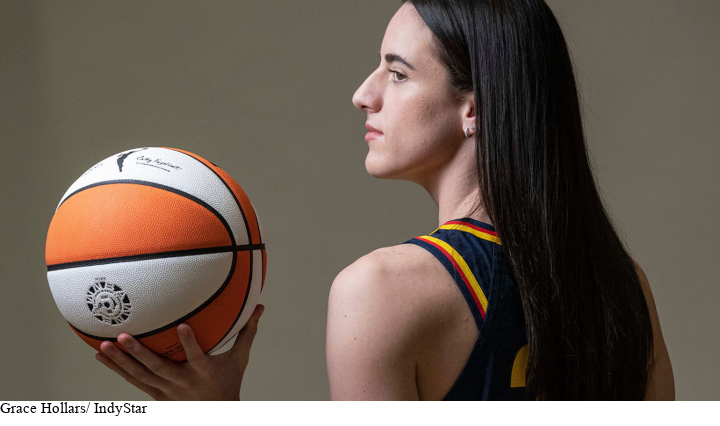
Interest in the WNBA is at an all time high since Indiana Fever point guard CAITLIN CLARK (22) entered the league as the number one overall draft pick, but not everyone is happy about it.
The rookie sensation recieved the most votes by any player on this year's WNBA All-Star ballot, but she was inexplicably left off the USA women's Olympic team. Clark is averaging 16 points and 5.7 assists per game, which are tops among rookies. Among all players, she ranks third in assists per game.
On Sunday, Clark led the Fever's rally from a 15-point deficit to beat DIANA TAURASI (42), BRITTANY GRINER (33) and the Phoenix Mercury on the road and received a standing ovation from the sellout Phoenix crowd as she walked off the court signing autographs. Meanwhile, Griner skipped the postgame and Taurasi spent the press conference scratching, blinking and trying to avoid mentioning Clark's name. Taurasi's teammante NATASHA CLOUD (32) spent the presser doing her best "O-Dog" impression from Menace II Society.
This, of course, is the same team that threw shade at SKYLER DIGGINS-SMITH (33)... but more on that later.
Diana Taurasi and Nate Cloud after loss to Indiana Fever
Numbers Never Lie
Last night, the Fever, who at one point played 11 games in 20 days, marched into Sin City for a matchup against A'JA WILSON (27) and the Las Vegas Aces. Demand for tickets was so great, the game had to be moved from the Michelob ULTRA Arena to the T-Mobile Arena to accommodate another 6000 seats. Tickets, normally priced at $12, were going for $82 and the attendance still broke a Las Vegas Aces franchise record, with a sellout crowd of 20,366 fans. It was also the largest crowd for a regular-season WNBA game in a quarter century.
The two-time defending champion Aces blew the Fever out 88-69 to win their fifth straight, behind a 28-point, 9-rebound performance from Wilson. Clark struggled from the field in the first 20 minutes, making just 1 of 7 from the floor, including going 0 for 4 from 3-point range. She finished the game with 13 points and 11 assists.
The big winner last night was the WNBA and its handful of meanigful advertisers. "The Clark Effect" is clearly putting butts in seats and eyeballs on screens. That not only means exposure for the spunky six foot guard from Iowa, but also more recognition for players like A'ja Wilson, who many people had never seen play, and Clark's teammates KELSEY MITCHELL (28) and ALIYAH BOSTON (22), who were also named to the All-Star team.
More eyeballs equals more money from advertisers, media and ticket buyers. More money equals better contracts, facitilities and travel accommodations for every player in the league. Sounds like everybody wins.
So, why all the (not-so-subtle) animosity?
WNBA trying to sabotage Caitlin Clark?
Conspiracy theories are swirling around Caitlin Clark and one Sudanese troll on ESPN even compared the rookie phenom to a fictional Nazi character, named "Stormfront", from the Amazon series The Boys.
Clark, however, is not the first rookie standout to face the WNBA's hazing rituals, which are only okay with certified weirdos, like "America's Worst Dad" winner, DWYANE WADE (42).
League of Their Own
CANDICE WIGGINS (37) was the all-time leading scorer in Stanford and Pac-10 women's basketball history when Minnesota selected Wiggins as the third overall pick in the 2008 Draft. Wiggins would go on to win a championship with the Lynx in 2011.
According to Wikipedia:
On March 22, 2016, Wiggins announced her retirement from the WNBA after eight seasons, despite being only 29 years old and without a career-threatening injury. In a 2017 interview with The San Diego Union-Tribune, Wiggins called the league's culture "very, very harmful" and "toxic to me" and said she had been bullied on the court throughout her WNBA career for being heterosexual and nationally popular.
Wiggins added, "I wanted to play two more seasons of WNBA, but the experience didn't lend itself to my mental state. During the interview, she remarked:
"Me being heterosexual and straight, and being vocal in my identity as a straight woman was huge. I would say 98 percent of the women in the WNBA are gay women. It was a conformist type of place. There was a whole different set of rules they (the other players) could apply."
Skyler Diggins-Smith, who is an attractive, married heterosexual mother of two, says she was not allowed to use the Phoenix Mercury practice facility while on maternity leave last season and was ultimately traded to Seattle.
Responding to a fan on X, formerly Twitter, who noticed that the Mercury did not wish Diggins-Smith a happy birthday on social media the previous day, the six-time All-Star responded:
"They're not gonna acknowledge me this year and it's OK guys. We're not affiliated unless it's the checks....per management. I can't even use the practice facility or any resources."

Los Angeles Sparks Dearica Hamby with her husband and daughter.
DEARICA HAMBY (30), a core member of the Las Vegas Aces' 2022 WNBA championship team, alleged that her former organization treated her in an "unprofessional and unethical way that ... has been traumatizing" due to her pregnancy. After being traded to the Los Angeles Sparks, Hamby, who is also an attractive, married heterosexual mother of two, had this to say:
"Being traded is part of the business. Being lied to, bullied, manipulated, and discriminated against is not."
According to Outsports, the number of gay women in the WNBA ranges from 33–85%. In 2018, it was reported that 32% of that year's WNBA All-Star team, which included marquee names like SUE BIRD (43), Brittney Griner and Diana Tarausi, publicly indentified as LGBTQ, so it's no great revelation that lesbian women make up a large (and loud) constituency in lockerooms. What the league and commissioner CATHY ENGELBERT (59) spend most of their time downplaying are the mulitple domestic violence accusations against WNBA players.
Before being arrested on drug smuggling charges in Russia, Brittany Griner, one of Time magazine's "100 most influential people in the world", was charged for disorderly conduct and assault on her babymama in 2015. Griner was suspendd seven games and was also required to complete 26 weeks of domestic violence counseling, but she's on this year's Olympic team with 42-year-old Diana Taurasi, who is also openly gay.
So, let's address the pink elephant in the room.
Caitlin is quietly disrupting the WNBA ecosystem just by being a sterotypical midwestern girl with a boyfriend, who also happens to have atypical ball skills, court vision and shooting range. The fact that she is white and from a traditional two-parent home in America's heartland wouldn't matter if Clark were gay. Those would be pluses.
The truth is that the WNBA is in the midst of a major identify crisis because it desperately wants to attract the kind of family-friendly interest that Caitlin Clark is generating and promote its LGBTQ+ lifestyle at the same time.
The league has always been gay, but it's never made money.
Maybe it's time to try something different.



